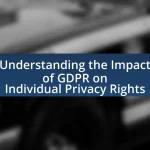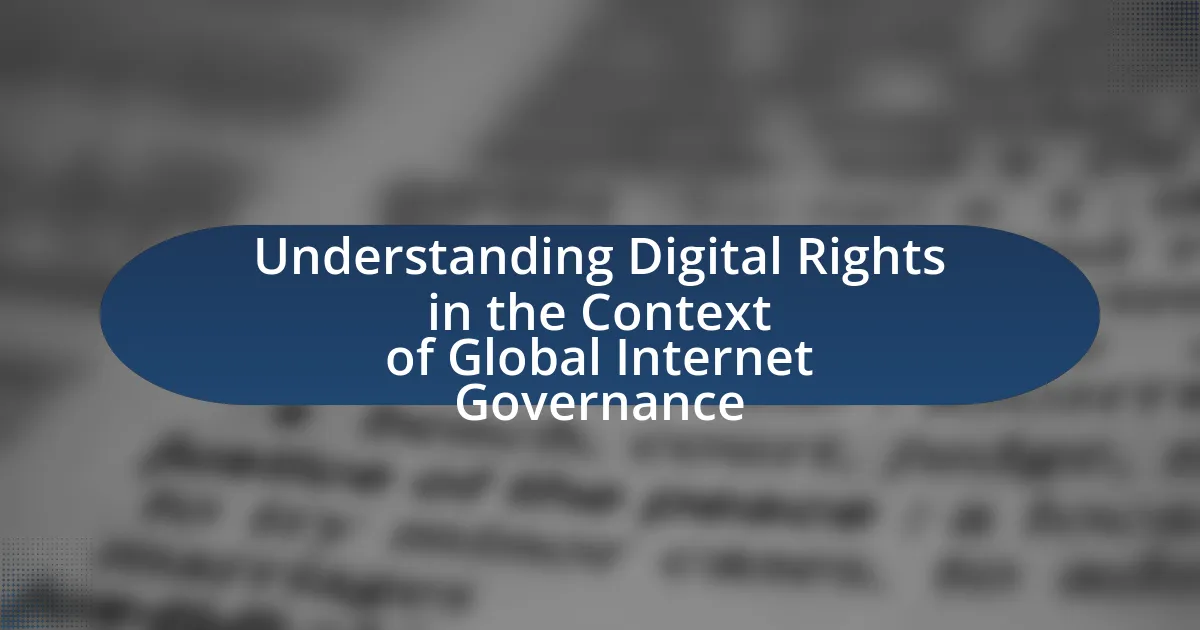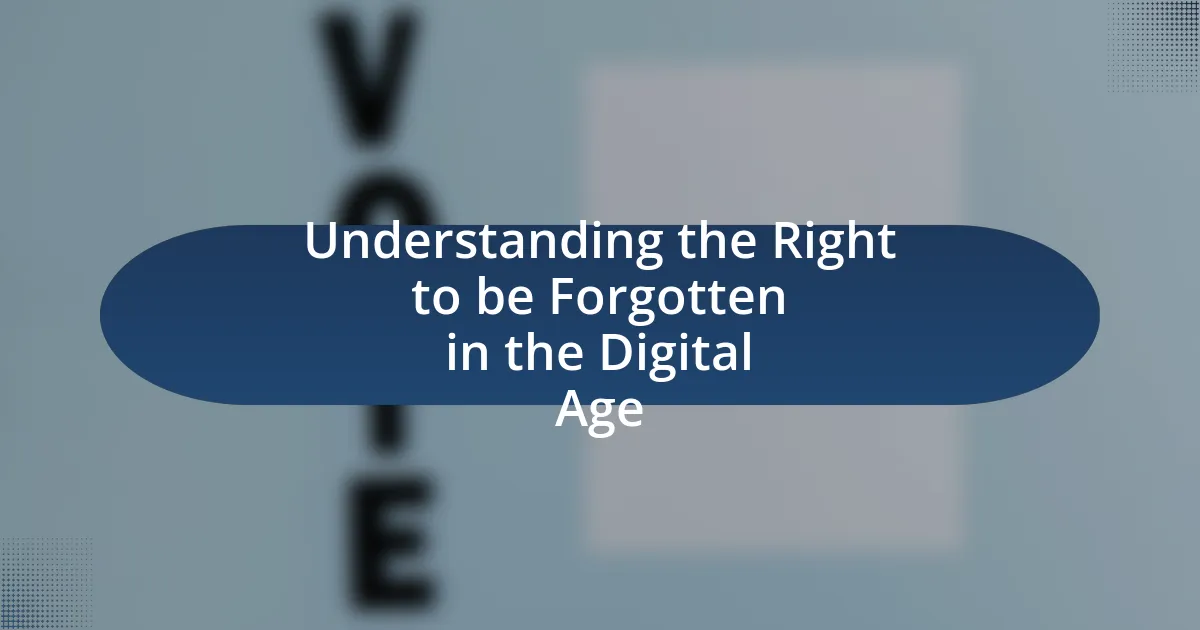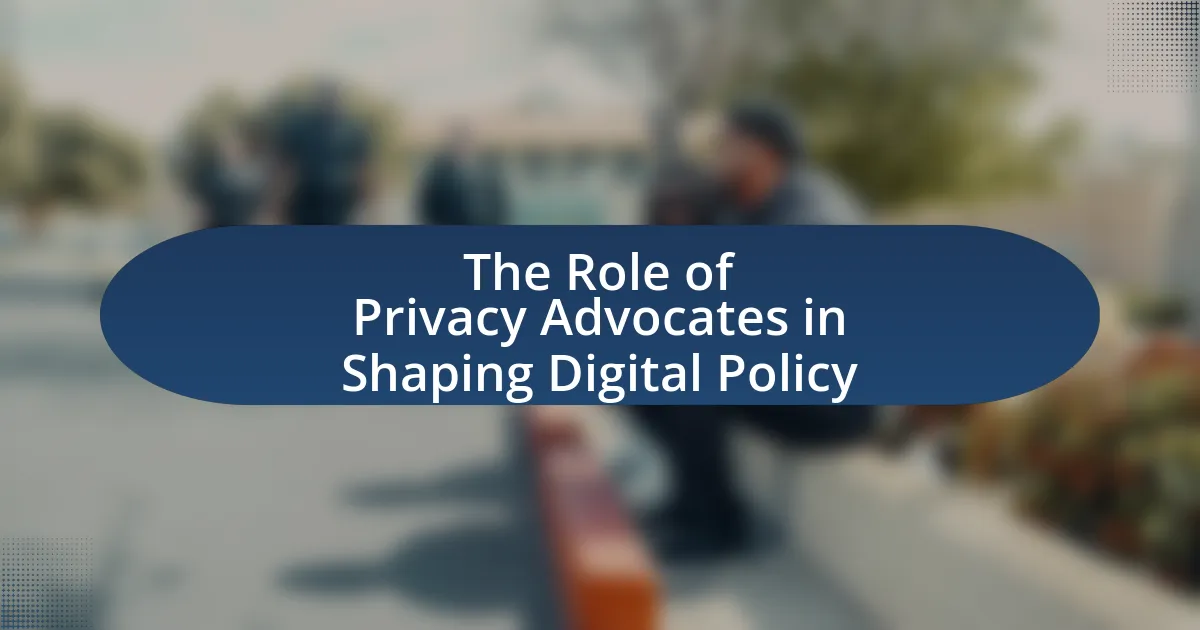Digital privacy in a post-COVID world is increasingly critical as the pandemic has accelerated the adoption of digital technologies, raising concerns about data security and surveillance. The article examines the impact of COVID-19 on digital privacy, highlighting new challenges such as increased surveillance, data collection, and the vulnerabilities associated with remote work. It emphasizes the importance of protecting digital privacy through strategies like strong passwords, two-factor authentication, and the use of privacy-focused tools. Additionally, the article outlines best practices for maintaining digital privacy, the risks of neglecting it, and common misconceptions that can lead to vulnerabilities.

What is Digital Privacy in a Post-COVID World?
Digital privacy in a post-COVID world refers to the protection of personal information and data in an increasingly digital and interconnected environment shaped by the pandemic. The COVID-19 crisis accelerated the adoption of digital technologies, leading to heightened concerns about data security, surveillance, and the misuse of personal information. According to a report by McKinsey & Company, 75% of consumers have tried new digital channels during the pandemic, which has increased the volume of personal data shared online. This shift necessitates stronger privacy measures, including enhanced encryption, stricter data regulations, and greater transparency from companies regarding data usage.
How has the COVID-19 pandemic impacted digital privacy?
The COVID-19 pandemic has significantly impacted digital privacy by accelerating the adoption of surveillance technologies and increasing data collection by governments and private companies. During the pandemic, many countries implemented contact tracing apps and health monitoring systems, which often required extensive personal data, raising concerns about user consent and data security. For instance, a report by the Electronic Frontier Foundation highlighted that many of these apps lacked transparency and adequate privacy protections, leading to potential misuse of sensitive information. Additionally, remote work and online services surged, resulting in a greater reliance on digital platforms that may not prioritize user privacy, as evidenced by increased data breaches and cyberattacks during this period.
What new challenges to digital privacy have emerged during the pandemic?
New challenges to digital privacy that emerged during the pandemic include increased surveillance and data collection by governments and private companies. As remote work and online services surged, many organizations implemented tracking technologies to monitor employee productivity and user behavior, often without adequate transparency. For instance, a report by the Electronic Frontier Foundation highlighted that contact tracing apps raised concerns over data misuse and long-term storage of personal information. Additionally, the rise in telehealth services led to the collection of sensitive health data, which, if not properly secured, poses risks of breaches and unauthorized access. These developments underscore the need for stronger privacy protections in a rapidly digitizing world.
How have remote work and online interactions changed privacy concerns?
Remote work and online interactions have significantly heightened privacy concerns due to increased data exposure and reliance on digital communication tools. As employees access sensitive information from home networks, which often lack robust security measures, the risk of data breaches escalates. A study by the Ponemon Institute in 2021 revealed that 70% of organizations experienced a data breach related to remote work, highlighting vulnerabilities in home office setups. Additionally, the use of collaboration platforms has led to greater surveillance and tracking of employee activities, raising ethical questions about privacy rights. These factors collectively underscore the urgent need for enhanced privacy protections in a remote work environment.
Why is protecting digital privacy important today?
Protecting digital privacy is crucial today due to the increasing prevalence of data breaches and surveillance. In 2021, over 22 billion records were exposed in data breaches, highlighting the vulnerability of personal information. Furthermore, as remote work and online activities surged during the COVID-19 pandemic, individuals became more susceptible to identity theft and cyberattacks. The rise of digital platforms has also led to extensive data collection by corporations and governments, raising concerns about personal autonomy and consent. Therefore, safeguarding digital privacy is essential to maintain security, trust, and individual rights in an increasingly interconnected world.
What are the potential risks of neglecting digital privacy?
Neglecting digital privacy can lead to significant risks, including identity theft, financial loss, and unauthorized access to personal information. Identity theft occurs when sensitive data, such as Social Security numbers or bank account details, is stolen and used fraudulently, affecting millions annually; for instance, in 2020, over 1.4 million identity theft reports were filed in the United States alone. Financial loss can arise from cyberattacks, where hackers exploit weak privacy measures to drain bank accounts or make unauthorized purchases. Additionally, unauthorized access to personal information can result in harassment, stalking, or data breaches, as seen in high-profile cases where companies failed to protect user data, leading to millions of records being compromised. These risks underscore the importance of maintaining robust digital privacy practices.
How can breaches of digital privacy affect individuals and organizations?
Breaches of digital privacy can lead to significant financial loss and reputational damage for both individuals and organizations. For individuals, such breaches can result in identity theft, financial fraud, and emotional distress, as personal information is exposed and misused. According to a 2020 report by the Identity Theft Resource Center, there were over 1,100 data breaches in the United States alone, affecting millions of individuals and leading to billions in losses.
For organizations, breaches can result in costly legal penalties, loss of customer trust, and diminished market value. A study by IBM found that the average cost of a data breach in 2021 was $4.24 million, highlighting the financial impact on businesses. Furthermore, organizations may face regulatory scrutiny and increased compliance costs following a breach, as seen with the implementation of the General Data Protection Regulation (GDPR) in Europe, which imposes strict penalties for data protection failures.
Thus, breaches of digital privacy have far-reaching consequences that can affect the financial stability and reputation of both individuals and organizations.

What Strategies Can You Use to Protect Your Digital Privacy?
To protect your digital privacy, utilize strategies such as employing strong, unique passwords, enabling two-factor authentication, and regularly updating software. Strong passwords reduce the risk of unauthorized access, as studies show that 81% of data breaches are linked to weak passwords. Two-factor authentication adds an extra layer of security, making it significantly harder for attackers to gain access even if they have your password. Regular software updates patch vulnerabilities that could be exploited by cybercriminals, thereby enhancing your overall security posture.
How can you enhance your online security?
To enhance your online security, utilize strong, unique passwords for each account and enable two-factor authentication (2FA) wherever possible. Strong passwords should be at least 12 characters long, combining letters, numbers, and symbols, which significantly reduces the risk of unauthorized access. According to a study by the National Institute of Standards and Technology (NIST), using 2FA can block 99.9% of automated attacks, making it a critical layer of security. Regularly updating software and being cautious of phishing attempts further fortifies your defenses against cyber threats.
What role do strong passwords play in protecting digital privacy?
Strong passwords are essential for protecting digital privacy as they significantly reduce the risk of unauthorized access to personal accounts and sensitive information. A strong password typically includes a combination of uppercase and lowercase letters, numbers, and special characters, making it difficult for attackers to guess or crack through brute force methods. According to a study by the National Institute of Standards and Technology (NIST), weak passwords are a leading cause of data breaches, with 81% of hacking-related breaches leveraging stolen or weak passwords. Therefore, utilizing strong passwords is a critical measure in safeguarding digital privacy against cyber threats.
How can two-factor authentication improve your security?
Two-factor authentication (2FA) significantly enhances security by requiring two forms of verification before granting access to an account. This additional layer of security makes it more difficult for unauthorized users to gain access, as they would need both the password and a second factor, such as a code sent to a mobile device. According to a study by Google, implementing 2FA can block 100% of automated bots and 99% of bulk phishing attacks, demonstrating its effectiveness in protecting sensitive information.
What tools and technologies are available for privacy protection?
Various tools and technologies are available for privacy protection, including Virtual Private Networks (VPNs), encryption software, secure messaging apps, and privacy-focused web browsers. VPNs, such as NordVPN and ExpressVPN, encrypt internet traffic, masking users’ IP addresses and enhancing online anonymity. Encryption software like VeraCrypt secures files and data, making them inaccessible without the correct password. Secure messaging apps, such as Signal and WhatsApp, utilize end-to-end encryption to protect conversations from unauthorized access. Privacy-focused web browsers, like Brave and Firefox, block trackers and ads, ensuring a more private browsing experience. These tools collectively contribute to safeguarding personal information in an increasingly digital world.
Which VPN services are recommended for safeguarding your online activities?
NordVPN, ExpressVPN, and CyberGhost are recommended VPN services for safeguarding online activities. NordVPN offers strong encryption and a no-logs policy, ensuring user privacy. ExpressVPN is known for its high-speed servers and robust security features, making it suitable for streaming and browsing securely. CyberGhost provides user-friendly applications and a large server network, enhancing accessibility and privacy. These services have been recognized in various reviews and comparisons for their effectiveness in protecting digital privacy, particularly in a post-COVID world where online activities have surged.
How can privacy-focused browsers and search engines help?
Privacy-focused browsers and search engines enhance digital privacy by minimizing data tracking and protecting user information. These tools often block third-party cookies, limit fingerprinting, and do not store search histories, which reduces the amount of personal data available for advertisers and potential data breaches. For instance, browsers like Brave and search engines like DuckDuckGo have built-in features that prioritize user anonymity and security, making it difficult for companies to profile users based on their online behavior. This approach not only safeguards individual privacy but also promotes a more secure online environment, as evidenced by studies showing that users of privacy-centric tools experience fewer targeted ads and reduced exposure to data harvesting practices.
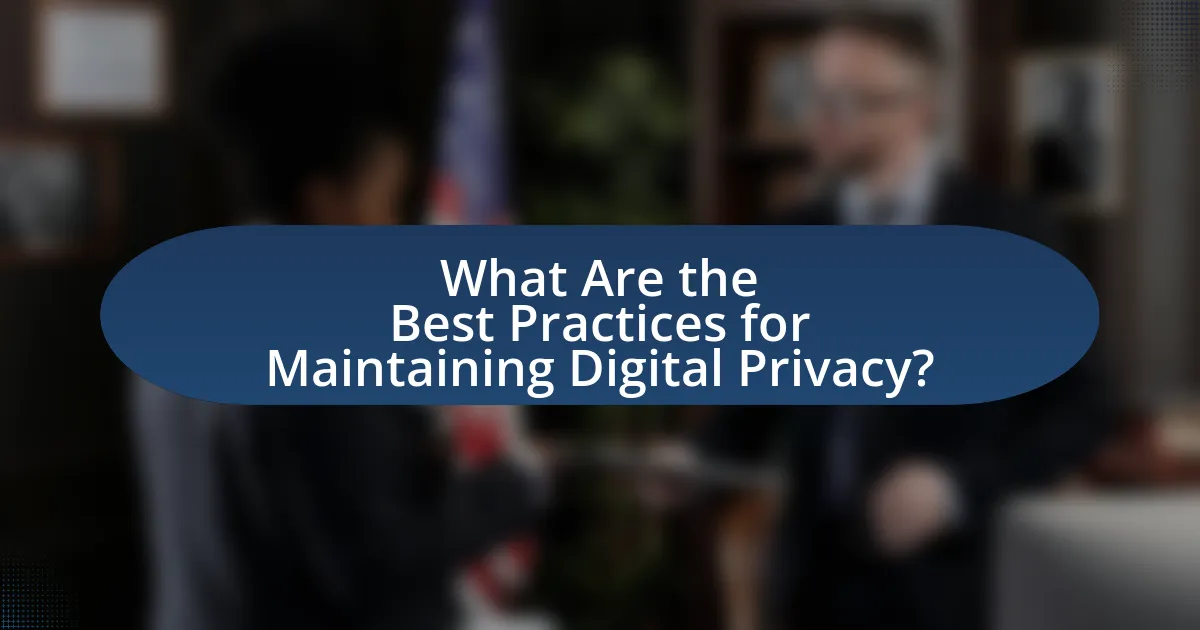
What Are the Best Practices for Maintaining Digital Privacy?
The best practices for maintaining digital privacy include using strong, unique passwords, enabling two-factor authentication, regularly updating software, and being cautious with personal information sharing. Strong, unique passwords reduce the risk of unauthorized access, while two-factor authentication adds an extra layer of security. Regular software updates patch vulnerabilities that could be exploited by cybercriminals. Additionally, being mindful of what personal information is shared online minimizes exposure to data breaches. According to a 2021 report by the Identity Theft Resource Center, data breaches increased by 68% compared to the previous year, highlighting the importance of these practices in protecting digital privacy.
How can you manage your social media privacy settings effectively?
To manage your social media privacy settings effectively, regularly review and adjust your privacy settings on each platform. This includes setting your profile to private, controlling who can see your posts, and limiting friend requests to known contacts. According to a 2021 Pew Research Center study, 81% of social media users have taken steps to enhance their privacy, such as changing their settings or deleting accounts. Regularly updating passwords and being cautious about third-party app access further strengthens your privacy.
What information should you avoid sharing on social media platforms?
You should avoid sharing personal information such as your home address, phone number, and financial details on social media platforms. Sharing this sensitive information increases the risk of identity theft, fraud, and unwanted contact. According to the Federal Trade Commission, identity theft affected over 1.4 million consumers in 2020, highlighting the dangers of oversharing personal data online. Additionally, revealing your location or travel plans can make you vulnerable to burglary or stalking, as indicated by various law enforcement agencies. Therefore, maintaining privacy by limiting the disclosure of such information is crucial for digital safety.
How can you review and adjust your privacy settings regularly?
To review and adjust your privacy settings regularly, access the privacy settings section of each online platform you use, such as social media, email, and cloud services. Regularly checking these settings allows you to manage who can see your information, control data sharing, and update permissions based on your current preferences. For instance, studies show that 70% of users are unaware of their privacy settings, highlighting the importance of proactive management. By setting reminders to review these settings quarterly, you can ensure that your digital privacy remains aligned with your evolving needs and concerns.
What steps can you take to protect your data while using public Wi-Fi?
To protect your data while using public Wi-Fi, utilize a Virtual Private Network (VPN). A VPN encrypts your internet connection, making it difficult for hackers to intercept your data. According to a study by the Federal Trade Commission, public Wi-Fi networks are often unsecured, which increases the risk of data breaches. Additionally, avoid accessing sensitive information, such as banking details, on public networks, and ensure that websites you visit use HTTPS for secure communication. Enabling two-factor authentication on accounts adds an extra layer of security, further safeguarding your data against unauthorized access.
Why is it important to avoid sensitive transactions on public networks?
It is important to avoid sensitive transactions on public networks because these networks are inherently insecure and susceptible to interception by malicious actors. Public networks, such as those found in cafes or airports, lack robust encryption and can expose personal information, financial data, and login credentials to hackers. According to a study by the Federal Trade Commission, over 60% of data breaches occur due to unsecured networks, highlighting the significant risk associated with conducting sensitive activities in such environments.
How can you use a VPN when connecting to public Wi-Fi?
To use a VPN when connecting to public Wi-Fi, first, install a reputable VPN application on your device. Once installed, open the VPN app and connect to a server before accessing the public Wi-Fi network. This process encrypts your internet traffic, protecting your data from potential threats on unsecured networks. According to a study by the Cybersecurity & Infrastructure Security Agency, using a VPN can significantly reduce the risk of data interception on public Wi-Fi, making it a crucial tool for maintaining digital privacy.
What are some common misconceptions about digital privacy?
Common misconceptions about digital privacy include the belief that using incognito mode provides complete anonymity and that social media privacy settings are sufficient for protecting personal information. Incognito mode only prevents the browser from saving your history; it does not hide your activity from websites or your internet service provider. Additionally, studies show that many users do not fully understand the implications of social media privacy settings, which often do not prevent data collection by the platforms themselves or third parties. According to a 2021 Pew Research Center survey, 81% of Americans feel they have little to no control over the data collected about them by companies, highlighting the inadequacy of relying solely on privacy settings for comprehensive protection.
Why do people underestimate the importance of digital privacy?
People underestimate the importance of digital privacy primarily due to a lack of awareness about the risks associated with data exposure. Many individuals believe that their personal information is not valuable or that they have nothing to hide, leading to complacency regarding their online security. Research indicates that 79% of internet users are concerned about how companies use their data, yet only 30% actively take steps to protect their privacy online, highlighting a significant gap between concern and action. This disconnect often stems from a general misunderstanding of how data breaches can lead to identity theft, financial loss, and erosion of personal freedoms.
How can misinformation about digital privacy lead to vulnerabilities?
Misinformation about digital privacy can lead to vulnerabilities by causing individuals to underestimate risks associated with their online activities. When people believe false information, such as the idea that their data is always secure or that privacy settings are sufficient without further action, they may neglect essential security measures. For instance, a study by the Pew Research Center found that 81% of Americans feel they have little control over their personal information online, which can be exacerbated by misleading narratives that downplay the importance of proactive privacy practices. This lack of awareness can result in behaviors such as using weak passwords, failing to enable two-factor authentication, or sharing sensitive information on unsecured platforms, ultimately increasing the likelihood of data breaches and identity theft.
What practical tips can you implement to enhance your digital privacy?
To enhance your digital privacy, implement the use of strong, unique passwords for each online account. Research indicates that 81% of data breaches are due to weak or stolen passwords, highlighting the importance of password security. Additionally, enable two-factor authentication (2FA) wherever possible, as it adds an extra layer of security by requiring a second form of verification. Regularly update your software and applications to protect against vulnerabilities, as outdated software can be an easy target for cyberattacks. Use a virtual private network (VPN) to encrypt your internet connection, which helps safeguard your data from potential eavesdroppers. Finally, be cautious about the personal information you share online, as oversharing can lead to privacy breaches.


